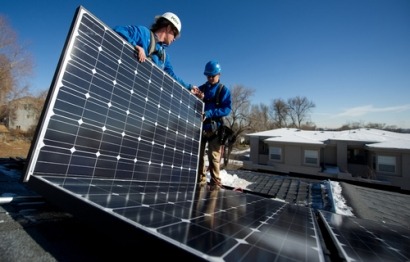
The study was commissioned by Sunrun, Inc., America’s largest residential solar installer. It was conducted by Harris Interactive, and included a total 1,475 homeowners.
Susan Wise, spokeswoman from Sunrun, the initiative was inspired by the company’s first-hand experience.
“You see an interesting dynamic when you work so closely with solar,” she explained. “We have this great way for people to go solar without all the high upfront costs – solar power service – and all of our customers love it, but at the same time, solar power makes up less than one percent of the energy used in the US.
“What this suggests is that there’s a disconnect out there, that people don’t understand that solar can be affordable, and we wanted to quantify it,” she said.
Most of those who participated in the poll said they believed installing solar panels on their home would cost $20,000 or more.
Sunrun pioneered the solar power service concept, through which homeowners commit to buy low-cost power for a fixed period, while the installer continues to own, insure, monitor and maintain the solar panels on the homeowner’s roof.
According to the survey 95 percent of respondents expressed concern about their rising utility bills, and 44 percent said they would install solar panels within the next year if they cost was not a factor.
“That tells us what’s needed most is education about the sector and how it can fit into people’s budgets,” Wise said.
Asked how that message would be conveyed, Wise said Sunrun believes the best tool will likely prove the most simple of all – word of mouth.
“You’re much more likely to do this if someone you know has done is, and as people become more aware and start to adopt this technology, they’ll tell friends who will become intrigued and pretty soon the message will be mushrooming out there,” she said.
“The other thing that is important and will continue to be is media coverage, articles, segments on television… and then there are a lot of grassroots things going on, information sessions, visiting events where people would go to learn about different things they can do with their homes,” she continued. “And lastly, advertising and marketing will also play a big role.”
Wise concedes there are challenges as well as opportunities inherent in all those approaches – for instance, when the mass media in the US reports on the solar industry these days, the subject of the report is as likely to be the political bickering over the Solyndra collapse or the US trade dispute with China over cheap import panels, as it is about solar in general.
But she says it has also become abundantly clear that solar is enjoying tremendous success in what she called “the downstream market,” the installation market.
“Once the media sees how that area is thriving and growing, they will be interested in that dynamic and say, ‘There is success in that industry, let’s write about that,’” she said.
Sunrun was founded in 2007, while it’s founders were still in business school. It was then that they heard about a company that was operating on an early iteration of their solar power service model, and decided they could not only best the model, but also offer solar power to homeowners for substantially less than the competition.
“They developed a business model that worked and in our first four years we acquired about 10,000 customers and then, in just the past 11 months, we’ve doubled that number,” Wise said. “So you can see that our growth is happening at a very fast pace, same thing for this business model – in California as of last month, 75 percent of people choosing to go solar are choosing to do so utilizing a formula like ours.”
Presently, solar power supplies less than one percent of electricity in the US, according to the Us Energy Information Administration.
For additional information:

